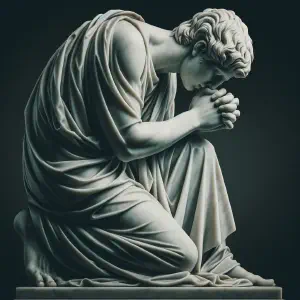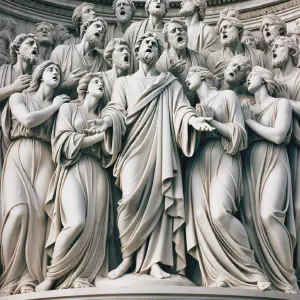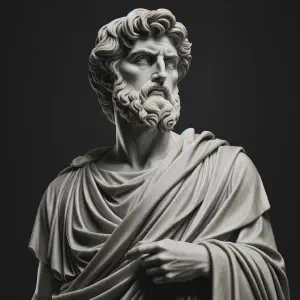The Vision of Nebuchadnezzar and the Prophecy of Kingdoms
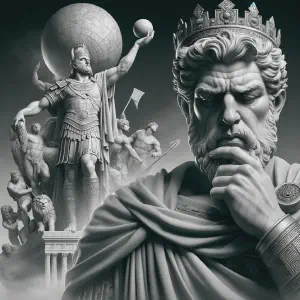
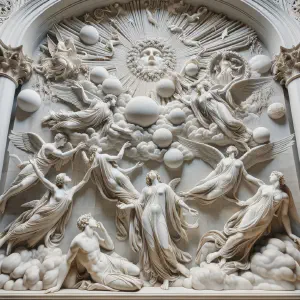
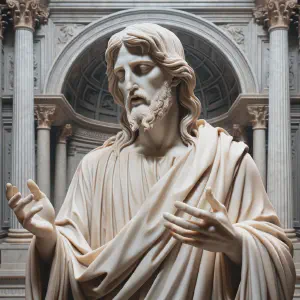
Christ’s prophecy extended beyond immediate destruction, hinting at a deeper, spiritual upheaval. Kingdoms would rise and fall, nations would clash, and the earth itself would groan under the weight of upheavals, both natural and human-made. Yet, amidst these tumultuous events, He promised a crown of life to those who remained steadfast in faith. His words echoed Daniel’s vision: the temporal gives way to the eternal, and the true power lies not in the hands of earthly rulers but in the unshakeable dominion of the Divine.
Five Questions
What does the statue in Nebuchadnezzar’s dream represent in Daniel’s interpretation?
The statue symbolizes successive kingdoms, each represented by a different metal: gold for Babylon, silver for a subsequent, inferior kingdom, bronze for a third kingdom ruling over the earth, and iron for a strong but divided fourth kingdom. The statue’s destruction by a divine stone signifies the emergence of God’s eternal kingdom, which will outlast and replace all earthly powers.
How does the Responsorial Psalm relate to the theme of Daniel’s interpretation?
The Responsorial Psalm, with its repeated call to give glory and eternal praise to God, complements the theme of Daniel’s interpretation. It emphasizes the permanence and supremacy of God’s kingdom as opposed to the fleeting nature of human empires. The psalm celebrates the omnipotence of God, a stark contrast to the temporal and fragile human kingdoms represented in Nebuchadnezzar’s dream.
In the Gospel of Luke, Jesus predicts the destruction of the Temple. How does this connect with the themes in Daniel?
Jesus’ prediction of the Temple’s destruction parallels the impermanence of the grand statue in Nebuchadnezzar’s dream. Both signify the transient nature of earthly structures and powers, no matter how magnificent. Jesus’ prophecy, like Daniel’s interpretation, points to the enduring nature of God’s kingdom, which transcends earthly realms and human constructs.
What do the warnings of false prophets and calamities in Luke’s Gospel signify?
The warnings about false prophets and the foretelling of wars, earthquakes, and famines serve as reminders of the challenges and deceptions believers will face. These events are depicted as birth pains leading to a new era, echoing the theme of transformation from temporal to eternal. They underscore the need for discernment and steadfast faith amidst the trials and changes of the world.
How do these scriptures collectively guide a Catholic in understanding their faith and the world?
These scriptures guide Catholics to understand the transitory nature of worldly power and the permanence of God’s kingdom. They teach the importance of discerning truth amid deception, maintaining faith amidst trials, and focusing on the eternal rather than the temporal. These passages collectively call for a perspective that values spiritual endurance and the eternal sovereignty of God over the fleeting dominion of earthly realms.
Bible Study
Daniel 2:31-45
Daniel said to Nebuchadnezzar:
“In your vision, O king, you saw a statue,
very large and exceedingly bright,
terrifying in appearance as it stood before you.
The head of the statue was pure gold,
its chest and arms were silver,
its belly and thighs bronze, the legs iron,
its feet partly iron and partly tile.
While you looked at the statue,
a stone which was hewn from a mountain
without a hand being put to it,
struck its iron and tile feet, breaking them in pieces.
The iron, tile, bronze, silver, and gold all crumbled at once,
fine as the chaff on the threshing floor in summer,
and the wind blew them away without leaving a trace.
But the stone that struck the statue became a great mountain
and filled the whole earth.
“This was the dream;
the interpretation we shall also give in the king’s presence.
You, O king, are the king of kings;
to you the God of heaven
has given dominion and strength, power and glory;
men, wild beasts, and birds of the air, wherever they may dwell,
he has handed over to you, making you ruler over them all;
you are the head of gold.
Another kingdom shall take your place, inferior to yours,
then a third kingdom, of bronze,
which shall rule over the whole earth.
There shall be a fourth kingdom, strong as iron;
it shall break in pieces and subdue all these others,
just as iron breaks in pieces and crushes everything else.
The feet and toes you saw, partly of potter’s tile and partly of iron,
mean that it shall be a divided kingdom,
but yet have some of the hardness of iron.
As you saw the iron mixed with clay tile,
and the toes partly iron and partly tile,
the kingdom shall be partly strong and partly fragile.
The iron mixed with clay tile
means that they shall seal their alliances by intermarriage,
but they shall not stay united, any more than iron mixes with clay.
In the lifetime of those kings
the God of heaven will set up a kingdom
that shall never be destroyed or delivered up to another people;
rather, it shall break in pieces all these kingdoms
and put an end to them, and it shall stand forever.
That is the meaning of the stone you saw hewn from the mountain
without a hand being put to it,
which broke in pieces the tile, iron, bronze, silver, and gold.
The great God has revealed to the king what shall be in the future;
this is exactly what you dreamed, and its meaning is sure.”
This passage from the Book of Daniel features the prophet Daniel interpreting King Nebuchadnezzar’s dream. Daniel, an Israelite taken into Babylonian captivity, serves God with great faith and wisdom. He interprets the dream of a great statue representing successive kingdoms, culminating in God’s eternal kingdom. This aligns with Catholic teachings on the transience of earthly power and the permanence of God’s kingdom. It reflects the Catholic values of trusting in divine providence and the ultimate triumph of God’s will, akin to themes in the catechism regarding God’s sovereignty.
Daniel 3:57, 58, 59, 60, 61
R. (59b) Give glory and eternal praise to him.
“Bless the Lord, all you works of the Lord,
praise and exalt him above all forever.”
R. Give glory and eternal praise to him.
“Angels of the Lord, bless the Lord,
praise and exalt him above all forever.”
R. Give glory and eternal praise to him.
“You heavens, bless the Lord,
praise and exalt him above all forever.”
R. Give glory and eternal praise to him.
“All you waters above the heavens, bless the Lord,
praise and exalt him above all forever.”
R. Give glory and eternal praise to him.
“All you hosts of the Lord, bless the Lord;
praise and exalt him above all forever.”
R. Give glory and eternal praise to him.
This segment of the Book of Daniel is a hymn of praise, calling all creation to bless and exalt the Lord forever. It echoes the role of the faithful in acknowledging and glorifying God’s omnipotence, as seen in Catholic liturgy and prayer. The hymn aligns with Catholic teachings on the worship of God, as outlined in the First Commandment, and underscores the importance of praise as a form of honoring God. It embodies the Catholic understanding of creation’s purpose to glorify the Creator, reflecting themes of gratitude and reverence found in the catechism.
Luke 21:5-11
While some people were speaking about
how the temple was adorned with costly stones and votive offerings,
Jesus said, “All that you see here–
the days will come when there will not be left
a stone upon another stone that will not be thrown down.”
Then they asked him,
“Teacher, when will this happen?
And what sign will there be when all these things are about to happen?”
He answered,
“See that you not be deceived,
for many will come in my name, saying,
‘I am he,’ and ‘The time has come.’
Do not follow them!
When you hear of wars and insurrections,
do not be terrified; for such things must happen first,
but it will not immediately be the end.”
Then he said to them,
“Nation will rise against nation, and kingdom against kingdom.
There will be powerful earthquakes, famines, and plagues
from place to place;
and awesome sights and mighty signs will come from the sky.”
In this Gospel passage, Jesus predicts the destruction of the Temple in Jerusalem and warns of false prophets, wars, and natural calamities. Jesus, the central figure of Christianity, embodies God’s truth and grace. His prophecy highlights the impermanence of earthly structures and the trials believers will face, aligning with Catholic teachings on the eschatological realities and the need for vigilance in faith. This passage encourages Catholics to discern truth and to maintain faith amidst trials, resonating with the Beatitudes and the call to spiritual resilience found in Catholic teachings.
Lessons
These passages collectively teach us about the transient nature of earthly kingdoms and the enduring sovereignty of God’s kingdom. They remind us of the importance of faith and discernment in times of uncertainty and change. The vision of Nebuchadnezzar and the words of Jesus highlight the inevitability of change and the impermanence of worldly powers, contrasting them with the eternal nature of God’s kingdom. The responsorial psalm and the alleluia verse reinforce the need to praise and trust in God’s unchanging nature and his ultimate dominion over all creation. As Catholics, we are called to focus on the eternal and unshakeable kingdom of God, maintaining faith and hope amidst the ebb and flow of temporal affairs.
Meditation Prayer
